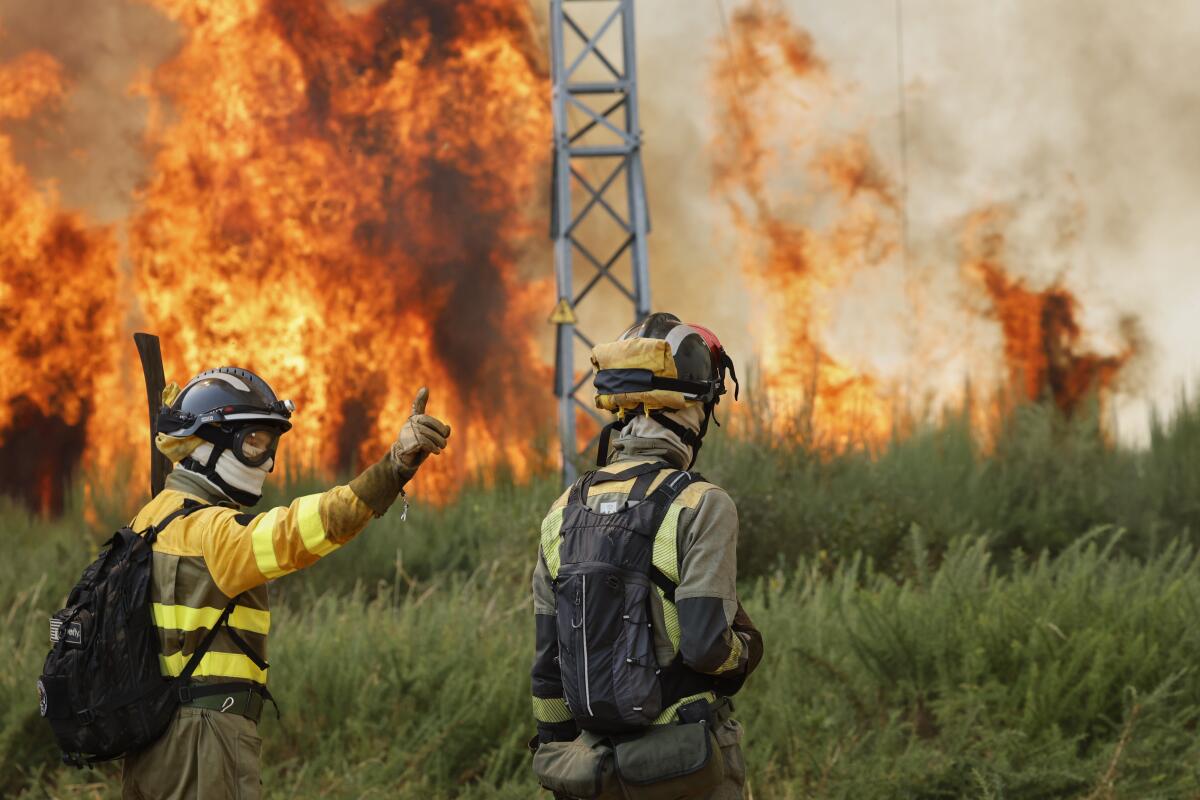Spain is deploying an additional 500 soldiers to combat wildfires that have ravaged vast areas of woodland amid a severe heat wave. Prime Minister Pedro Sánchez announced this decision on Sunday as authorities grapple with multiple forest fires, particularly in the northwestern region of Galicia. This move adds to the more than 1,400 troops already engaged in firefighting efforts, as the country anticipates reinforcements in the form of aircraft from other European nations.
The Galician government has reported that firefighters are currently tackling 12 significant wildfires, all located in proximity to the city of Ourense. At a press conference, Alfonso Rueda, head of the Galician regional government, emphasized the ongoing threat to homes, stating, “We have lockdowns in place and are carrying out evacuations.” The region has been battling these fires for over a week, with the situation exacerbated by soaring temperatures. On Sunday, temperatures were expected to reach as high as 113 degrees Fahrenheit (45 degrees Celsius) in some areas, according to the Spanish national weather agency, AEMET.
The impact of the wildfires has been significant. This year alone, fires in Spain have consumed approximately 390,000 acres, an area comparable to the size of metropolitan London, as reported by the European Forest Fire Information System. Climate change is intensifying the frequency and severity of heatwaves and dryness in Europe, making the region increasingly susceptible to wildfires, according to data from the European Union’s Copernicus Climate Change Service.
As Spain continues to battle these blazes, the country is also expecting support from other nations. Two Dutch water-dropping planes are set to join aircraft from France and Italy, which are already assisting Spanish firefighters under a European cooperation agreement. Virginia Barcones, chief of Spain’s Civil Protection Agency, confirmed that additional firefighters from other countries are anticipated to arrive in the coming days.
In response to the wildfires, the national rail operator Renfe announced the suspension of high-speed train services between Madrid and Galicia on Sunday. Galician authorities have advised residents to wear face masks and limit outdoor activities to mitigate exposure to smoke and ash.
While Spain faces extreme heat and wildfires, neighboring Portugal is experiencing a shift toward cooler weather. The country has been on a national state of alert for wildfires since August 2, a status expected to conclude on Sunday, coinciding with the arrival of two Swedish firefighting planes. More than 4,000 firefighters and over 1,300 vehicles have been deployed in Portugal, alongside 17 aircraft, according to the country’s Civil Protection Agency. Preliminary estimates suggest that the area affected by fires in Portugal this year is around 340,000 acres, significantly higher than in previous years.
In a broader context, other European nations, including Greece, Bulgaria, Montenegro, and Albania, have also requested assistance from the EU’s firefighting force to combat ongoing forest fires. This year, the force has been activated as frequently as it was during the entirety of last summer’s fire season.
Meanwhile, in Turkey, wildfires have had devastating effects, resulting in the deaths of 19 individuals. On Sunday, precautionary evacuations were ordered in parts of the historic Gallipoli region, where memorials commemorate the World War I campaign. Approximately six villages were evacuated, according to Omer Toraman, governor of Canakkale province. About 1,300 firefighting personnel, supported by 30 aircraft, are actively combating these blazes.
The ongoing wildfires across Southern Europe underscore the urgent need for coordinated international response efforts in the face of increasingly severe climate conditions.
